Fleurs du Mal Magazine


Or see the index
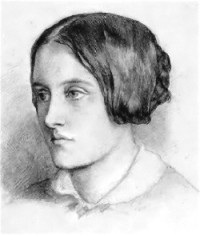
Winter: My Secret
I tell my secret? No indeed, not I:
Perhaps some day, who knows?
But not to-day; it froze, and blows, and snows,
And you’re too curious: fie!
You want to hear it? well:
Only, my secret’s mine, and I won’t tell.
Or, after all, perhaps there’s none:
Suppose there is no secret after all,
But only just my fun.
To-day’s a nipping day, a biting day;
In which one wants a shawl,
A veil, a cloak, and other wraps:
I cannot ope to every one who taps,
And let the draughts come whistling through my hall;
Come bounding and surrounding me,
Come buffeting, astounding me,
Nipping and clipping through my wraps and all.
I wear my mask for warmth: who ever shows
His nose to Russian snows
To be pecked at by every wind that blows?
You would not peck? I thank you for good-will,
Believe, but leave that truth untested still.
Spring’s an expansive time: yet I don’t trust
March with its peck of dust,
Nor April with its rainbow-crowned brief showers,
Nor even May, whose flowers
One frost may wither through the sunless hours.
Perhaps some languid summer day,
When drowsy birds sing less and less,
And golden fruit is ripening to excess,
If there’s not too much sun nor too much cloud,
And the warm wind is neither still nor loud,
Perhaps my secret I may say,
Or you may guess.
Christina Georgina Rossetti
(1830 – 1894)
Winter: My Secret
• fleursdumal.nl magazine
More in: 4SEASONS#Winter, Archive Q-R, Archive Q-R, Rossetti, Christina

Ich wollt gern
Ist keiner, der das merken will,
und würft die Rosen an ein Wend,
daß solcher B[e]trug mög haben End?
Wo hat man größer Narren je
gefunden in der Welt dann hie?
Doch weiß ich ein[en], der hat ein Herz,
würd dienen wohl zu diesem Scherz.
So hoff ich zu Kün[i]g Karles Mut,
daß sei in ihm ein teutsches Blut,
und werd mit Ehren üben sich
dem Papst entgegen gwaltigklich,
und nehmen ab von seinem Fuß
die Krone nit, ich hoff, er tus,
und hab ein künigklichen Sinn.
Fürwahr ich in der Hoffnung bin.
Dann ist es nit ein große Schmach,
ein Hochfahrt und unförmlich Sach,
daß der soll herrschen in der Welt
dem Papst zu seinen Füßen fällt,
und muß die küssen mit dem Mund?
Ich sag, das ist ein rechter Fund,
desgleichen kein Tyrann nie dacht,
wie groß er hätt Gewalt und Macht.
So ist gewiß, und liegt am Tag,
daß Christus solichs gar nit pflag,
der seinen Jüngern wusch die Füß,
und sie dergleichen gberen hieß.
Wer nun will sein in solcher Acht
als Gott die zwölf Apostel macht,
der sei ihn[en] mit den Werken gleich,
von Gotts Geboten niendert weich,
so halt ich ihn zu gleicher Ehr.
Wo aber einer anders wär,
und meint beineben diesem Stand
zu herrschen über Leut und Land,
und haben weltlich Regiment,
des[sen] Macht muß werden bald zertrennt,
dann dies seind widerwärtig Ding.
Drumb sag ein jeder oder sing,
so ist doch kunntlich Gottes Sinn,
was ihm, und was dem Teufel dien.
Dann niemand beiden dienen kann,
er muß des einen müßig gahn.
Ist nun der Papst ein geistlich Mann,
so seh er, wie er Land regier,
und geistlich Namen nit verlier.
Dann je nit ist des Geistes Sach,
Gepräng und Wollust stellen nach.
Das wissent Ablaßkrämer wohl,
noch seind sie so des Geizes voll,
daß sie der Wahrheit schweigen ganz,
und geben aus ein falschen Glanz,
domit die Welt betrogen werd,
und Aberglaub regier auf Erd.
Der Eigennutz gaht allweg mit,
des wöllen sie entbehren nit.
Und suchen List auf alle Weg,
das Nutz gebär, und Leut beweg.
Die reden von der Hellen Pein
als ob die ihn bekannt möcht sein,
und was uns geb vor Freuden Gott,
die messen sie aus mit dem Lot,
und haben großen G[e]winn darvon.
Drumb ob kein Hell wer nindert schon,
so kämen doch die Pfaffen her
und predigten ein neu(w)e Mär,
dem Volk zu machen einen Graus,
uff daß ihn[en] Geld gefiel heraus.
Dann was ihn Geld und Nutzung bringt,
ein jeder do sein Liedlin singt.
Zu sammlen Geld steht all ihr Mut,
drumb Pfaff zu werden ist gar gut.
Sunst wöllt die Blatten niemand han,
und müßten leer die Kirchen stahn.
Wo aber ist ein frommer Mann,
der sich der Geistlicheit nimmt an,
die heilgen Gschrift auslegen kann,
mit keiner Pfrund man ihn versicht.
Dann wer jetzt nit mit Schalkheit ficht
zu Rom und würd ein Kurtisan,
den lassen sie dohinden stahn.
Ich wollt gern (dörft ich) führen Klag,
eim jedermann die Wohrheit sag,
gemeinen Irrtumb machen klar,
und viel Gebrechen offenbar,
dardurch dies Nation beschwert,
ganz teutsches Land vertrucket hert,
die Sitten werden gar verkehrt.
So seind die Menschen so verblendt,
daß man die Wahrheit nit erkennt,
und achtet Aberglauben mehr
dann christenlich und Gottes Lehr.
Dann wo der Wahrheit einer pflegt,
gar bald man sich entgegen legt,
damit werd solichs untertredt.
Hat einer dann zu weit geredt,
die Geistlicheit gegriffen an,
den hält man für ein bösen Mann,
und schuldget ihn der Ketzerei.
Ach Gott zu dir ich ruf und schrei,
des Menschen Sinn wöllst geben ein
Erkanntnus und der Wahrheit Schein,
durch deines Geistes göttlich Kraft,
der solichs auch vor Zeiten schafft,
do er erleuchtet menschlich Sinn,
gab Wahrheit ein, treib Falschheit hin.
Dann du auch selb die Wahrheit bist,
als zeuget der Evangelist.
Gib, daß erkenn dies Nation
wie weit sei dein Genad davon,
Wo man von deiner Gottheit schreibt,
und doch bei Geldes Nutzung bleibt.
Wo man durch Gottes Namen schwürt,
und doch des Teufels Reich entbürt.
Wo man sich Geistlicheit nimmt an,
und Büberei doch für lößt gan.
Wo jedermann ein Priester nennt,
den man doch als ein Buben kennt.
Der selb mit Sitten, die er iebt,
eim andern bös Exempel giebt.
Wo der eins Hirten Namen hat,
gar nichtes denkt, mit Hilf und Rat,
wie er verhieten mög die Herd,
allein der Milch und Wollen gert.
Ach Gott erleucht die G[e]salbten dein,
daß sie durch deines Geistes Schein
verstehen in der Gleisnerei,
was Christenheit und Wahrheit sei,
verlih mir, daß ich sag darvon.
Ob man mich dann verfolget schon,
das trifft allein den Körper an,
die Seel man mir nit töten kann,
als du hast selb geredt darvan,
und durchs Propheten Mund geseit,
wie weit geh der Tyrannen Gleit.
Hierumb ich sprich aus deiner Lehr,
die Priester sollten weltlich Ehr,
und dieses zeitlich Regiment
nit setzen vor dein Testament,
und was do wär des Körpers Sach,
do sollten sie nit denken nach.
Dann geistlich Leben ist ihr Fug,
des hast du Beispiel geben gnug.
Nach Fleisches Werk hast nit getracht,
der Welt Regierung ganz veracht.
Allein der Himmel was dein Reich,
und was demselben gmäß und gleich,
das hast du dir geeiget zu.
So hat jetzo der Papst kein Ruh,
wie er mit gwaltigklicher Hand
truck unter sich Städt, Leut und Land.
Spricht dann es sei der Kirchen Gut,
heißt halten das in steter Hut.
Und nimmt sich an Sanct Peters Gwalt,
den er auch iebet manigfalt
mit Binden, Lösen hie auf Erd.
Als ob das angesehen werd
in Hellen und im Paradeis.
Ach Gott nun mach all Herzen weis,
daß nit mög werden zugestallt
eim bösen Menschen solcher Gwalt.
Uff hörtem Stein dein Kirch gebaut,
allein den Frommen würd vertraut.
Uff daß die hab ein festen Grund,
und bleib in guter Lehr gesund.
Man sicht wohl wie ein jeder lebt,
nach Gottes Ehr der Papst nit strebt,
allein in zeitlich Gut erhebt.
Drumb auch zwei Schwert er meint zu han
und läßt dich Schlüssel hinten gan.
Dich wollt vor Zeiten werfen auf
zu Künig ein großmächtig Hauf,
do bist du weit geflohen hin.
So ist nur jetzt des Papstes Sinn,
daß er der Welt Regierer sei,
und unter ihm leb niemand frei.
Dem er auch zu Gezeugnus trägt
ein Kron dreifaltig aufgelegt.
Und schleift das Purper hinten nach,
in Demut hat er kein Gemach,
mit Hoffart treibt allein sein Sach.
Und daß er Richtumb mög erwerben,
muß mancher frummer Christen sterben.
Dann Stehlen heimlich ist nit gnug,
zu Morden, Streiten habents Fug.
Allein der Papst ihm vorbehält
was wider Ehren ist gestellt,
das heißt er dann der Kirchen Gwinn
und geht allein ihm Bosheit hin.
Ich wollt gern, daß gelogen wär,
er hält kein Glauben, acht kein Ehr.
Deshalb ob ich hätt gschworen schon,
gar bald ich lassen mag darvon,
das schafft ein Absolution.
Wie mögen das sein göttlich Ding,
doher dein Namen achten g[e]ring,
die andern Leuten sollten sich
zu Beispiel setzen offentlich?
Die deine Schaf befolhen han,
des Hirten Amts sich nehmen an,
und sollten nur der Seelen Heil
bedenken, und nit tragen feil
dein Geistlicheit, dein göttlich Gunst,
als ob du die nit gäbst umbsunst.
Dann du sichst an des Menschen Mut
viel mehr, dann was er hab an Gut.
So schickents täglich Bullen her,
als ob nach deinem Willen wär,
den Himmel schätzen umb ein Geld,
der allen Frummen zugestellt
durch dich, und vormals geben ist.
Dann darzu kommen hilft kein List,
und würd der Ablaß schaffen nit,
es geh dann rein Gewissen mit.
Wo dann ist gut die Conscienz,
da frag man nit nach Indulgenz.
Sie hand des aber gpflegt so viel,
daß jetzo niemand leben will,
er hab ihm dann ein Ablaß kauft.
Drumb mancher auch gen Rom hin lauft,
und holt ein Brief mit Siegel schwer,
sein Sinn ist guter Gdenken leer.
Nur uff die Gschrift er sich verlat.
Wo er dann zu der Beichtung gat,
verzählt er was ihm sei erlaubt.
Doran jetzt mancher fester glaubt
dann Christ Herr an die Wahrheit dein,
des Himmels Freud, der Hellen Pein.
Also zu Sünd man Urlaub gibt,
darumb jetzt sünden manchem liebt,
und werden Laster, Schand gemehrt,
gut Weis und Sitten gar verkehrt.
Dann wer wollt meiden übeltun,
so man das kann ußtilgen nun?
Zu dispensieren sich vermeint
der Papst, als ob er sei vereint
mit Gott umb solichs, und ihm fug
so falscher Trug und schandlich Lug,
dardurch die Welt geärgert würd,
gemeiner Mann am Glauben irrt.
Dann wo umb Geld man kaufen kann,
daß nichtes Übel sei getan,
und nit allein die Sünd vergibt,
die einer etwan hat geiebt,
und ist geschehen, sonder mehr,
auch wider Recht und göttlich Lehr,
was einer noch in Willen hat
tut lassen zu, und gibt dem statt,
fürwahr do würd kein Ehr geacht,
das Volk zu Sünden geursacht.
So haben unser Eltern auch
den Pfaffen etwan in Gebrauch
gegeben unser Güter viel.
Meinthalb ich nichts verheben will,
Doch ist gewest der selben Mut,
daß solichs kumm der Seel zugut,
und werd geweitert Gottes Ehr.
So sicht man jetzo wenig mehr
die priesterlichem Leben nach
regieren sich. Allein die Sach
der Geistlicheit am Namen leit,
der Gtat will jeder sein gefreit.
Man darf nit fragen wen ich mein,
sicht große Schar, nit ein allein.
Die Pröpst, und Dechan nennen sich,
Prälaten, Pfarrer offentlich,
Thumherren, und Officiäl,
Äbt, Prior, und Provinciäl,
Erzpriester, Bischöf, und der gleich,
die all der Kirchen werden reich.
Und leben niemands doch zugut,
allein uff Prassen steht ihr Mut,
und essen, trinken was wohl schmeckt,
mit Zobel, Marder werden g[e]deckt.
Die Wochen gehnd sie zwir ins Bad
in feisten Schauben, weichem Wath,
mit Frauen scherzen, müßig gan,
und alles Lusts sich nehmen an.
Ist dann ein geistlich Leben das,
so müßt ich sprechen dann fürbas,
daß Gottes Wort nit wär gerecht.
Wer solichs gern zum besten brächt,
den heischen sie zum Feuer bald,
und würd ihm ernstlich nochgestallt.
Ich sag, es ist Beköhrung not,
und sollt man mich drumb schlagen ztod.
Der Müßiggänger seind zu viel,
darzu die Pfaffen über Ziel
und Moß an sich jetzt kaufen Gut.
Dann nimmer würd erfüllt ihr Mut,
ihr Geiz hat weder Ziel noch End,
zu Gwinnen kehrens Füß und Händ.
Allein des Wuchers habens Fug,
des sie doch nimmer pflegen gnug.
Als ob ihn[en] Rauben sei erlaubt,
dann mancher jetzt durch Irrtumb glaubt
daß geistlich Rauben sei kein Sünd.
Und ob man einen Pfaffen fünd,
der durch Betrug und Büberei
den Kirchen brächt viel Gutes bei,
Durch Wucher und Behendigkeit,
sein Lob muß werden ußgebreit,
man gibt ihm zu all Ehrberkeit.
Hat gsammlet Kasten, Keller voll,
der Kirchen vorgestanden wohl,
sein Leben keiner schelten soll.
Darzu ich sag, es ist nit gut,
daß man uffsetzen will ein Hut
den Sachen die nit billig seind.
Gott hat es anders auch gemeint,
sprach, daß ihm sei ein hässig Ehr,
ein Opfer, das von Raub kum her.
Hierumb, so rauben niemand soll,
wie pflegt sein dann ein Priester wohl?
Ich hör sie lehren allen Tag
als lut nur jeder rufen mag,
wie Wucher sei so große Sünd,
daß man die gnug kaum büßen künd,
wie Gut, das man mit Wucher gwinnt
den Seelen mach viel Pein geschwind.
Und sich in ihren Werken doch,
daß sie des pflegen iemer noch.
Gl[e]ich wie ein Bildstock Straßen zeigt,
die er zu gohn nit ist geneigt.
Es wär zu viel und wider Zucht,
wiewohl vielleicht nit gar ohn Frucht,
wo ich wollt decken auf all Schand,
die trieben jetzt in teutschem Land
viel, die man doch vor geistlich acht,
und leben sicht in großem Pracht,[206]
die schänden mancher Mutter Kind.
Noch ist die Welt so gar verblind,
daß man will d[ie] Wahrheit nit verstahn,
und nehmen sich der Sachen an.
Wiewohl ich weiß, und zw[e]ifel nit,
daß Schmerzen groß würd bringen mit,
Ärznei gegeben diesem Sitt.
Dem sei nun wie ihm werden kann,
so muß man doch je gr[e]ifen an,
das nutz und auch vonnöten ist,
und daß der Körpel bleib in frist,
die kranken Glieder schn[e]iden ab.
Latein ich vor geschrieben hab,
das was eim jeden nit bekannt.
Jetzt schrei ich an das Vaterland
teutsch Nation in ihrer Sprach,
zu bringen diesen Dingen Rach.
Und will man sunst kein Bschwerung mehr
erkennen, oder achten sehr,
so denk doch jedes Frommen Herz
ob do nit sei zu haben Schmerz,
daß stets gen Rom man Geld hinsend,
und wieder her als Übel wend.
Dasselb die Kurtisanen tun,
die diese Sachen tr[e]iben nun.
Ohn Zahl sie Geld von hinnen führen,
das wir vielleicht doch gern entbühren,
Wo nit die guten Sitten hie
zu Ergerung verkehrten sie.
Der welschen Possen sicht man viel,
der ich hie keinen nennen will.
Dann lasterlich zu reden laut
das, der zu würken keinem graut.
Und haben brocht in unser Land,
das vor den Teutschen unbekannt,
do habens uns beflecket mit.
Wer was der erst, darzu je riet,
daß man ein römisch Weis annähm?
Je mehr ich sag, je mehr ich schäm.
Drumb laß ich von der welschen Schand,
die (leider) nimmt fast überhand,
und rühr das römisch Regiment,
des Geiz hat weder Ziel noch End.
Wie kommen da wir Teutschen zu,
daß wir nit mögen haben Ruh
bei dem, das doch ist unser Gut?
Ein ander uns das nehmen tut,
und fordert unser Eigen ab,
glich ob er uns gefangen hab.
Wo seind wir schuldig worden je
dem Papst tributen, oder wie?
Wie darf er heischen Pension
von dem, das wir gestiftet hon?
Ists billig, daß den Stuhl erhalt
zu Rom der daruff hat kein Gwalt?
Was goht uns an, daß einer lebt
und in eim Pracht und Wollust schwebt?
Will er dasselb von uns bekomm?
Ach Gott, wir Teutschen seind zu fromm.
Wiewohl nit Frommkeit würd genannt,
daß wir ernähren Laster, Schand.
Dann gäben wir darzu kein Geld,
ihr unkeusch Leben wär zerfelt.
Ihr Bosheit halten wir in Gbrauch,
drumb Gott uns billig strafet auch.
Dasselb mir in Gedanken leit,
macht meim Gewissen manchen Streit,
daß wir so viel ußgeben han,
und’s doch geleget übel an.
Hört zu ihr Teutschen was ich sag,
aus Gottes Stiftung nimmer mag
bewiesen werd, uns schuldig sein,
dem Papst zu geben Geld hinein,
und umb ihn kaufen geistlich War,
Pfrund, Kirchen, Pfarren und Altar.
Gott hats gegeben all[e]s umbsunst,
und mag nit sein der göttlich Gunst,
wo man die Sakrament verkauft.
Kein[en] hat Gott nie umbs Geld getauft.
Die Zwölf er auch geheißen hat,
der Geizigkeit nit geben statt.
Er sprach, ihr habts umbsunst erlebt,
drumb auch umbsunsts den andern gebt.
Dann hätt er seinen Glauben feil
geboten je, und christlich Heil,
er hätt nit minder mögen han,
dann jetzt der Papst erschätzen kann.
Was aber ihm ein schnödes Ding,
wo einer nur mit Geld umbging.
Wo nun uff Geld der Himmel steht,
wie kann dann wahr sein Gottes Red,
der spricht, so müglich mögen sein
zu einem Nodelöhr gohn ein
ein ungefüges Kämeltier,
als könnt ein Reicher sich entbier
gen Himmel, und den wohnen in?
Fürwahr es hat ein andren Sinn.
Dann wo man sölichs köufen möcht,
daß Reichtumb mehr dann Armut döcht,
so wär nit wahr, daß Gott hat gseit,
den Armen sei sein Reich bereit.
Wo bl[e]ibt nun päpstlich Hinterlist,
durch den man überschwatzet ist
zu kaufen Ablaß und Genad,
uff daß man uns des Gelds entlad.
Ich will euch sagen was ich hör,
es ist geschehen kurz hievör,
do wollten die uß Reußenland
im Glauben haben sich erkannt,
und zu uns treten alle gleich,
do dacht der Papst zu werden reich,
und setzt ihn[en] auf ein großes Gold,
das man ihm jahrlich geben sollt.
Das hat den Reußen sehr verschmacht,
und haben sich der Sach bedacht,
die Kirchengmein zu kaufen nit,
wiewohl man ihn[en] die feil anbüt.
Also der Papst den Glauben mehrt
all Ehrberkeit von dannen zehrt,
die christlich Ordenung verkehrt.
Doch stiftens Örden mannigfalt,
der einer macht den andren alt.
Als muß man tragen Kleider an,
darbei man [er]kenn ein frommen Mann,
und sei am Glauben nit genug.
Ich sprich, sie habents nimmer Fug,
allein der Geiz sie darzu zwingt,
dann jeder Orden etwas bringt,
die bettlen auf durch alle Land,
und machen päpstlich Macht bekannt.
Franciscus ist des einen Gott,
Dominicus den andern hott,
Sanct Augustinus den gemacht.
Ich sag, Gott würd dardurch veracht.
Ein Orden ist die Christenheit,
do [be]darf man haben zu kein Kleid,
allein die Seel den an ihr hat,
das ist ein unvergl[e]ichlich Wath.
So mag ich größer Ehr nit han,
dann wo man einen Christenmann
tut nennen mich, das ist ein Ehr,
die ich allweg soll suchen mehr,
dann mich mit neuem G[e]setz beschwer.
Desgleichen Wallfahrt seind ohn Zahl
die machen auch uns Nahrung schmal.
Von dannen nimmt der Papst sein Teil.
Do find man die Mirakel feil,
und tobt das Volk hinnach ohn Maß,
hie seind die Pfaffen, loben das,
und sagen viel, was gschehen sei,
do doch nie kam ihr einer bei,
und wissen, daß sie liegen dran,
mit Wahrheit mögen nit bestahn.
Doch ist der Geiz, der sie das heißt,
der Papst mit diesen Falken beizt,
die jagen ihm das Wildbre(ch)t auf.
All christlich Wesen steht im Kauf.
Man denkt noch Fünden mancherhand,
daß von uns werd das Geld gewandt.
Jetz heischt man Geld zum Türkenkrieg,
do schämt sich keiner, daß er lieg.
Dann will man buwen wunderlich
Sanct Peters Kirchen übersich,
die wär sunst niedergfallen gar.
Mich wundert, daß mans gdenken dar.
Ob dann schon Rom tät Bau(w)ens not,
wie darf man drumb aufsetzen G[e]bot
den Teutschen, und uns heischen an,
das Walhen baß zu geben han?
Warumb würd nit die wellisch Art
mit Ablaß so beschweret hart?
Allein die Teutschen Narren sein,
das tut mir weh und macht mir Pein.
Und wollt das jedermann bedächt,
so fünd man nit der unser lächt.
Ihr Kardinäl ich sprich euch zu,
die uns zu [be] rauben habt kein Ruh,
und treibt die Sach ohn Maß und Ziel.
So je Sanct Peter fallen will,
so mindert diesen großen Pracht,
den ihr führt jetzt zu Rom mit Macht.
Zie(c)ht ab ein wenig vom Gepräng,
damit ihr Rom oft machet eng,
und nehmt von Überflüssigkeit,
darin ihr euch macht also breit,
so mögt ihr wohl so viel erspar,
daß steh Sanct Peters Münster gar.
Ihr nennet euch Aposteln gleich,
und seid doch nit von Tugend reich.
Unkeuscheit eu(w)er Leben ist,
kein Reinigkeit bei euch hat Frist.
Als künigklich ist euwer Statt,
das Christus nie gelehret hat.
Allein die Kirch wöllt ihr jetz sein,
und gebt doch alles Lasters Schein.
Ein Papst meint auch zu wöhlen ihr,
obschon darvon nit wissen wir.
Das tut ihr wider göttlich G[e]setz,
wiewohl ihr macht davon Geschwätz.
Ich sag euch, nehmt der Sachen acht,
viel frommer Teutschen seind bedacht,
die werden greifen euch in Zaum,
dann werdt ihr uns entr[e]iten kaum.
Ihr habt das Spiel getrieben gnug,
laßt ab, hört auf, ihr habts kein Fug.
Verwönet auch den Papst nit mehr,
daß er uns schick sein Schinder her,
die uns zu Beichten regen an,
das sie doch selbs nie gpfleget han.
Und sagen uns von jeder Speis,
von Essen uff ein neuwe Weis,
dann Fleisch, dann Fisch, mit Unterschied,
do singents von ein langes Lied,
und heißents halten fest und hert
als ob es Christus hätt gelehrt,
und ob es wär ein nötlich Ding.
Gott solichs sich nie unterfing,
und nit allein ists nit sein Lehr,
er hats auch widersprochen mehr,
kein Unterescheid uns heißen han
was eß und trink ein jederman.
Spricht Paulus auch, die Speis ist nit,
do wir Gott mögen g[e]fallen mit.
Hieß jeden essen was er fünd
am Speismarkt feil, ohn alle Sünd.
Ist aber jetzt ein größer G[e]bot
dann selbs je hat gestiftet Gott.
Des will ich sagen Ursach auch,
den Teutschen muß man diesen Rauch
vor d[ie] Augen blasen, der sie blendt,
daß Trügerei bleib unerkennt,
und werden Bullen teuer gnug.
Dann wo dies Nation wär klug,
so hätt das Evangelium
vor diesen Fabeln seinen Ruhm.
Doch soll man wissen, und ist wahr,
es seint vergangen etlich Jahr,
do wollt ich Rom erkennen auch,
und was da wär der Römer G[e]brauch.
Wie möcht ich hie von aller Schand
Verzählung tun, die ich do fand,
man sicht dergleich in keinem Land.
Und nit allein was ander tun,
(als dann die Welt sich ärgert nun)
mit Sünden, die do seind gemein,
viel Sachen Rom betreibt allein,
der[e]n etlich wider menschlich Art
und all natürlich Weis gekart.
Sunst hab ich gsehen große Schar
die Gassen treten hin und dar
viel Esel und viel stolzer Pferd,
der etlich viel Dukaten wert,
und seind gezäumet auf mit Gold.
Oft wenn ich auch spazieren wollt,
so kam ich mitten ins Gepräng,
von dem die Gassen waren eng,
und dieser Reuter g[e]sticket voll,
daß ich von Glück mag sagen wohl,
daß mich kein Esel trat zu Tod,
wiewohl ich hab gelitten Not.
Do ritten her die Kardinäl,
den folgten nach Officiäl,
Äbt, Bischöf und Prälaten viel,
die ich nit nennen kann noch will,
viel Dechant, Pröpst und ander Gschmeiß,
von den ich viel zu sagen weiß,
in Seiden, Purpur all gekleidt,
mit Schauben, Kutten ausgebreit.
Dann kam der Papst zu dieser Schar
uff einer wohlgeschmuckten Bahr,
den trugen zwölf Trabanten her,
als ob er möcht nit gehen mehr.
Do mußt man schrieen (vive) laut,
hofieren der geflenten Braut.
Drumb gibt er Benediction,
do würd man reich und selig von.
Sag einer nun wo Gottheit sei,
ob Christus auch müg wohnen bei
do ist ein so tyrannisch Pracht.
Hat Petrus auch dergleichen g[e]macht?
Das hab ich oft zu Rom gefragt,
es hat mirs aber niemand gsagt.
Darumb sie prangen mit Gewalt,
Gott hat ihn das nie zugestallt.
Ich hatt ein großes Wunder drab
oft wann ich solichs gsehen hab.
Zuvor der Kurtisanen Schar,
die möcht kein Mann verzählen dar.
Do liefen viel Kopisten mit,
viel tausend Schreiber, auch ein Glied
der Kirchen, die zu Rom regiert,
in dem jetz mancher Christen irrt.
Dann nit zu Rom die Kirch allein,
all Christen seind das in gemein.
Dann das der Papst zu Rom vermeint,
drumb hat er sich noch nie vereint
mit andern, will auch mit Gebühr,
daß sei zu Rom eins Papstes Kür.
Noch hab ich gsehen lang Prozeß,
ein Volk, der Frommkeit ungemäß,
viel schöner Frauen wohl gekleidt,
die jedem seind umbs Geld bereidt.
Mit den[en] der Rüffianer Heer,
von den[en] kein Gass in Rom ist leer.
Manch Advokat und Auditor,
Notarien und Prokurator,
die Bullen geben, sprechen Recht,
der jeder hat sein Gsind und Knecht.
Darunter ist manch wild Gesell,
den heißt man Cursor, den Pedell,
die auch ein Glied der Kirchen sein
zu Rom, und nehmen täglich ein
von Teutschen unser Schweiß und Blut.
Ist das zu leiden, und ists gut?
Ich rat, man geb ihn[en] fürter mee
kein Pfennig, daß sie Hungers Weh
ersterben und durch Armuts Not.
Daß nit zuwider Ehr und Gott
solch unnütz Volk uff Erden leb.
Drumb Geld hin ihn[en] kein Teutscher geb,
so mögents nit ernähren sich.
Wo nun man weiter fraget mich,
so wißt ich noch zu zöigen an
ein Völklin, manchen losen Mann,
seind auch im selben Regiment,
das man die christlich Kirchen nennt.
Dann jetzo Rom man weit und breit
hält für ein Haupt der Christenheit.
Das ist ein Jammer, des nit gleich.
Ach Gott, wo ist dein Himmelreich,
das stets verkauft des Papstes Gsind,
und uns verteuret so geschwind
die Buben, die ich hab genennt.
Hilf, des der Hauf werd bald zertrennt.
Dann wo das nit in Kürz geschicht,
daß dein Gewalt sich selb verficht,
so förcht ich, es werd übel gahn.
Sie haben g[e]äffet jedermann,
drumb mag es bleiben länger nit,
es muß das Kalb der Kuh gohn mit.
Das wär noch zu verhüten wohl.
Wo aber es geschehen soll,
so hilft darvor kein weiser Rat.
Ich bitt dich Herr Gott gib Genad,
daß werd gefreiet teutsches Land,
deim Volk dein rechter Glaub bekannt.
Sie nehmen uns all Freiheit ab,
drumb, do ichs vor gelassen hab,
uff setzen sie uns Fastenspeis,
das tun(d) sie nur mit Gwinnes Fleiß.
Dann ich zu Rom die Fasten aus
nie sah in eines Metzgers Haus
ein Fleischbank, die verschlossen wär.
Glaubt mir, ich hab gesehen mehr
sie essen durch der Fasten Zeit
Fisch, Wildbret, Vögel unvermeit.
In andern Städten auch dergleich,
so weit sich streckt der Walhen Reich.
Do hat man drab Gewissen klein,
ißt Fisch und Fleisch alls in gemein
Ohn, daß bei dem gemeinen Mann
der Päpst Gestift würd gsehen an.
Doch hab ich keinen Narren nie
gesehn, der umb Geld wie hie
Erlaubnus hab zu essen kauft.
Von hinnen nur der Pfennig lauft,
uff daß der Aberglaub besteh.
Das tut mir in meim Herzen weh.
Daß man das nit bedenken will,
des seind jetz solcher Lügen viel,
die man viel größer acht[et] und mehr,
dann heilig Schrift und christlich Lehr.
Und seind doch all nur uff Gewinn
und Eigennutz gegeben hin.
Drumb schickents ein Legaten her,
der mit dem Hor die Haut abscher.
Vor dem hie niemand essen mag
Milch, Buttern, der ihms vor nit sag,
und kauf ein Bullen drauf umbs Geld.
Se(c)ht nun, was diesen Leuten fehlt.
Und tätens das im welschen Land,
sie kämen bald zu Spott und Schand.
Ich weiß nit, ob noch etwas sei
vor diesen Buben blieben frei,
do nit dem Papst werd von gelohnt.
Sie haben je noch niemands g[e]schont.
Den Fürsten schickt man Rosen her,
die nehments an mit großer Ehr,
dargegen übergebens viel.
Also kein Frommer gfordert würd,
allein die Schalkheit ist geziert.
Das heißt man jetzt die Geistlicheit,
und ist so weit umbher gebreit,
daß Müßiggänger seind im Land
und die sich fleißen aller Schand,
mehr dann mag leiden nun die Welt
und Gott in seinem Reich gefällt.
Und seind der Kurtisanen voll
all Land, das sicht man leider wohl,
vor der[en] Gewalt und Büberei
kein Stiftung jetzt mag bleiben frei.
Dann wo noch etwas wär vorhand,
zu Rom der Kammern unbekannt,
do legens auf ein Pension,
obs hat gestift ein Teutscher schon,
und b[e]halten ihm Patronenrecht
allein für sich und sein Geschlecht,
das gilt zu Rom nit fürter me.
Der Papst sucht alle Vörtele,
wie er ein Nutz von dannen zig.
Do schad nit, ob man schwer und lig,
und brauchend Kurtisanen sich,
die wissen darin meisterlich
dem Papst zu raten wie er tu,
daß er ihm solich Freiheit zu
mög wenden gar, und habs allein,
die Hälft, das Dritteil sei zu klein.
Hierumb wo etwas frei noch wär,
bald bringen sie ein Ursach her
zu fassen das mit einem Strick.
Do werden gstellet Garn und Rick,
uff daß nur hie kein Freiheit bleib.
Drutz einem der dagegen schreib,
dann drumb ich solichs hab getan,
viel Abenteur muß ich bestahn,
und würd getracht nach meinem Leib.
Noch will ich bei der Wahrheit bleib,
und schreiben als eim Edeln g[e]bührt.
Ob das dann einen trifft und rührt,
der nehm mich an den Örten vör
do solichs kommen sall zu G[e]hör.
Sie wöllen aber nit darzu,
so kann ich auch mit haben Ruh,
und mag die Wahrheit schweigen nit,
wiewohl mir das kein Freund nie riet,
die förchten mein, das sieh ich wohl,
drumb aber ich nit schweigen soll.
Dem Vaterland will sein gedient,
So ist das Christenvolk verblindt,
das muß man bringen zu Gesicht.
Ob einer dann herwider ficht,
und meint vertrucken Recht mit Gwalt,
als dann ist jetzt die Welt gestallt,
do ist zu brauchen Aufenthalt,
und würd Gewalt vorbotten nit,
gibt weltlich und natürlich Sitt.
Sprich, ob ich schon geduldig wär,
so müßt ich dannocht haben Bschwer,
daß Geistlicheit ich kaufen sich,
und das g[e]schicht so offentlich,
daß Fugger treiben in der Bank,
darvon zu sagen ist zu lang.
Uffs kürtzst ich jetzo rüf und klag,
daß man zu Rom erkaufen mag,
das unser g[e]west so manig Tag.
Die Vikarien, mit dem Thum,
die Bischöf kaufents Pallium,
die selbig B[e]zahlung hat kein Maß,
das etwan hundert Guldin was,
das müssen jetzo tausend sein.
Darzu ein Botschaft man hinein
mit großen Kosten schicken muß,
dem Papst zu bringen einen Gruß,
daß er den Bischof konfirmier.
Darumb erfüllt man ihm sein Bgier
und gibt ihm, was er heischen tar,
das mehret sich von Jahr zu Jahr.
Do schätzt man dann die armen Leut,
nimmts Hor hinweg und auch die Heut.
Mich wundert, was doch mancher denk,
wann sie tun üben solich Schwänk,
ob er nit hab ein Grauen drab,
zu geben hin sein Gut und Hab,
uff daß ein Bischof sei im Land,
den er dann reiten sicht zuhand
mit Harnesch, Woffen wie ein Hild.
Dann beten, lehren jetz nit gilt,
und predigen, zur Kirchen gahn
dem Bischof je nit will zustahn,
wiewohl das wär sein Amt und Recht.
Man findt wohl einen armen Knecht,
der solichs alls vorwesen tu,
dem eignet man die Kirchen zu.
Also die Reichen schämen sich
der Geistlicheit, das wundert mich.
Die armen Pfaffen Arbeit han,
die reichen sicht man müßiggahn.
Also wir Herren haben g[e]zeugt
umbs Geld, wer anders sagt, der leugt.
Die haben jetzt allein den Pracht,
und ist kein Herrschung, noch kein Macht,
es müssen sein Prälaten da,
ohn die spricht niemand nein, noch ja.
Wie könnt man auch regieren wohl,
wenn wär das Reich nit Pfaffen voll?
Drumb steht es auch so wohl im Reich,
und gschicht eim jeden recht und gleich.
Ach Herr Gott, will man sehen nit,
erleucht die Sinn, ich aber bitt,
daß werd falsch Geistlicheit erkannt,
und sei der nit ein Bischof genannt,
der Bischofs Werk mitnichten pflegt,
allein sein Sach uff Wollust legt.
Wiewohl ein Teil auch Krieger seind,
der einer ist dem andern Feind.
Dasselbig ganz der Papst nit acht,
wenn man ihms Geld hinein hat bracht,
so leb ein Bischof wie ein Kuh,
do geht dem Papst nichts ab noch zu.
Also die Geistlicheit jetzt staht,
drumb geb ein jeder Frommer Rat,
wie sei zu tun in dieser Sach,
daß man uns länger nit verlach.
Sein Volk ein Bischof wöhlen soll,
der muß sein aller Tugend voll,
mit Kunst und Weisheit wohlgeziert,
dasselbig ihn recht konfirmiert.
Die Gotteslieb er auch soll han
und lassen allen Handel stahn,
domit die Welt bekömmert sich,
das lehrt Sanct Paulus offentlich,
und glaub, das nit wiß jedermann,
doch würd mans gschrieben finden stahn
und sals bedenken, das ist not.
Gott hat gelitten seinen Tod,
uff daß er uns in Freiheit setzt.
So hat mans Volk so überschwätzt,
das hat gemehrt der Pfaffen Zahl,
die man vor Herren halten sall.
Wie seind die Pfaffen aber gtan?
Das seind die jhen, die müßig gahn,
und triben Wollust und Gepräng,
all Städt und Flecken machen eng,
in langen Schauben, reinem Wadt,
mit Frauen scherzen, gehn ins Bad.
Das werden g[e]heißen geistlich Leut.
Ich rüf euch Teutschen zu der Beut.
Doch bitt ich vor Küng Karle dich,
wöllst dieser Sach genädigklich
erzöigen dich, und hören zu.
Dann was ich dieser Dingen tu,
soll g[e]schehen alls zu Ehren dir.
Dann sunst nit wollt gebühren mir,
im Reich Uffruhr zu heben an.
All freie Teutschen ich vermahn,
doch dir zu Undertänigkeit
zu sein in diesem Schimpf bereit,
daß g[e]holfen werd dem ganzen Land,
und ußgetrieben Schad und Schand.
Des sollt ein Hauptmann du allein,
Anheber, auch Vollender sein.
So will mit allem, das ich mag
zu Dienst dir kommen Nacht und Tag,
und bgehr von dir des keinen Lohn.
Möcht ich allein erlebet hon,
daß würd gelegt Beschwerung ab,
darvon ich viel geschrieben hab,
in Armut wollt ich sterben gern,
auch alles Eigennutz entbehrn.
So soll man auch hierin kein Ehr
mir schreiben zu, du bist der Herr.
Und was hierin gehandelt würd,
durch das dein Lob soll werden g[e]ziert.
Drumb hab ein Herz und schaff ein Mut,
ich will dir wecken auf zu gut
und reizen manchen stolzen Hild.
Habs schon ihr vielen ingebildt,
und fehlt allein an deim Gebot.
Hilf werder Künig, es ist not,
laß fliegen aus des Adlers Fahn,
so wöllen wir es heben an.
Der Weingart Gottes ist nit rein,
viel Ungewächs ist kommen drein.
Der Weiz des Herren Wicken trägt,
wer dozu nit sein Arbeit legt
und hilft das Unkraut tilgen aus,
der würd mit Gott nit halten haus.
Wir reuten aus Unfruchtbarkeit,
und tun(d) als Gott hat selbs geseit
zu dem, der solichs Rauben pflegt,
do ers Propheten Mund bewegt.
Du hast beraubt all Nation,
drumb dir auch werden widerstohn
all Völker, überfallen dich,
berauben wieder gwaltigklich.
Fürwahr das würd ein gute Tat,
ich gib all frommen Teutschen Rat,
seit sich nit bessert dieser Stadt.
Doch halt die Frommen ich bevor,
der greif man keinem an ein Hor.
Und die seind guter Gschrift gelehrt,
ich bitt, daß keiner werd versehrt.
Und wer ein geistlich Leben führt,
in dieser Sach bleib unberührt.
All Ding der Papst hat Übermacht,
wer das dann hat zum Besten gdacht,
den hat er mit dem Bann erschreckt.
Ich hoff, es seien schon erweckt
viel teutscher Herzen, werden sich
der Sachen nehmen an, als ich.
Ich hab je gut Vormahnung gtan,
ich hoff, sie lassen mich nit stahn.
Den stolzen Adel ich beruf,
ihr frommen Städt euch werfet uff,
wir wöllents halten in gemein,
laßt doch nit streiten mich allein.
Erbarmt euch übers Vaterland,
ihr werden Teutschen regt die Hand.
Jetzt ist die Zeit, zu heben an
umb Freiheit kriegen, Gott wills han.
Herzu, wer Mannes Herzen hat,
gebt vorter nit den Lügen statt,
domit sie han vorkehrt die Welt.
Vor hat es an Vormahnung gfehlt
und einem, der euch sagt den Grund,
kein Lai[e] euch domals weisen kund,
und waren nur die Pfaffen glehrt,
jetzt hat uns Gott auch Kunst beschert,
daß wir die Bücher auch verstahn.
Wohlauf, ist Zeit, wir müssen dran.
Do uns die Gschrift noch unbekannt,
do hettens alls in ihrer Hand,
und was sie wollten, was der Glaub,
das Volk sie machten blind und taub,
ward bald ein Schlechter überredt,
die Wahrheit schmählich undertredt,
all Predig was uff ihren Nutz,
do leid die Wohrheit manchen Stutz.
Dann wer die sagen wollt und lehrt,
ward von denselben bald gefährt.
Als Hussen gschah in Behmerland,
den habents für ein Ketzer gbrannt,
umb daß er bleib bei Christi Lehr,
und acht nit uff der Pfaffen Mär.
Sagt von dem Geiz, und Übermut,
Unkeuscheit, und der Kirchen Gut,
vom Gwalt des Papsts, der ihm nit ziemt,
und was er von den Christen nimmt,
und wie das geistlich Recht gesetzt,
dardurch die heilig Gschrift verletzt.
Solchs was die Wahrheit, ists auch noch,
die Pfaffen werden zornig doch.
Huß ward zitiert, und kam bereit,
der Kaiser Sigmund gab ihm Gleit,
und hielt ihms, als noch mancher tut,
in dem nit ist ein fürstlich Mut.
Doch hieß ihn solchs der Pfaffen Rat,
der Christum auch verdammet hat.
Sie sprachen, er wär schuldig nit
zu teilen Ketzern Glauben mit,
wiewohl man den eim Feind als wohl
als guten Freunden halten soll.
Drumb wär er gwest ein Ketzer schon,
man hätt ihm das unbillig gton.
Also ist Hussen worden g[e]lohnt.
Hieronymo ward nit verschont,
umb daß er hätt ein gleiche Sach.
Seithar hat niemand gwöllt hin nach
und förchten all des Feures Peen,
bitz jetzo unser rüfen zween.
Wer weiß, was jedem ist beschert,
wir haben je viel Leut beköhrt.
Darumb ich hoff, es hab nit not.
Wär mir dann schon gewiß der Tod,
noch wollt ich als ein frommer Hild
bei Wahrheit setzen Spieß und Schild,
und den Tyrannen widerstreben,
vor welchen niemands frei mag leben.
Die schrecken uns mit ihrem Bann,
den mancher förcht, und geht von dann.
Ich bin des aber nit gesinnt,
wiewohl sie handln fast geschwind.
Nit, daß ich Gottes Straf veracht,
ich sprich, ihr Bannen hab kein Macht.
Dann wie kann ander strafen, der
ist selbest von den Sünden schwer,
und stoßen mich vons Himmels Thron,
der selbest ist so weit darvon.
Doch habents lang die Leut betört,
und wer von Bannen hat gehört,
der ist von Schrecken worden kalt.
Domit sie b[e]hielten ihren Gwalt.
Und haben oft durch Bannes Kraft
viel Nutz und großen Frommen gschafft.
Umb Geldes willen und umb Gut
den Bann man jetzo üben tut.
Das ist nit recht und wider Gott.
Dann Bannen ist die letzte Not,
wann helfen will kein Straf noch Lehr,
und sich der Sünder nit bekehr,
ist doch vorhin so oft vermahnt,
als dann er rechtlich würd verbannt.
Wer aber jetzt die Wahrheit sagt,
mit Bannen den man bald verjagt.
Das ist nit göttlich und nit recht,
und der nit solichs widerfecht,
mit Gott er übel würd bestahn,
des will ich ihn gewarnet han.
Und hör nit auf, ich schrei und gilf,
bitz man der Wahrheit kommt zu Hilf,
und schicket sich zu diesem Krieg.
Wer weiß, ob ich noch unden lieg.
Am Rechten seind sie worden zag,
drumb denken sie mir heimlich nach.
Man soll noch sehen seltsam Gschrift.
Nächst wollten sie mir schenken Gift.
Gott half mir auch an einem Ort,
daß man mich heimlich nit ermordt.
Es hat auch nächst ein Gbot getan
der Papst, und Leuten gsunnen an,
sie sollen mich gen Rom hinein
ihm schicken, zu des Todes Pein.
Und daß man wiß, wie das gestallt,
er hats geboten mit Gewalt
eim Fürsten, viel zu tugendlich,
dann daß der sollt verraten mich.
Auch ist geschickt Küng Karle zu
ein grauer Münch, hat hölzen Schuh.
Derselbig Gleisner hat Mandat,
zu greifen mich in jeder Stadt,
und wo er mich im Land erschnapp.
Se(c)ht, was gedar die Münichs Kapp.
Dem frommen Künig er auch hat
gegeben einen falschen Rat,
nach dem ich übel hab getan,
erlauben ihm, mich fallen an,
und mit Gewalt zu führen hin.
Wiewohl ich nie geheischen bin
für Recht, noch g[e]antwort je ein Wort,
und mich kein Richter hat gehort.
Ihm ist auch bfolhen weiter me,
uff daß die Sach nur vor sich geh,
all Menschen bitten, gegen mir
zu helfen ihm nach seiner Bgier,
und daß ihm helf der weltlich Arm.
Ist niemand hie, den das erbarm?
Seind nit, die diese Tyrannei
beweg, daß sie mir wohnen bei,
und helfen mir mit Hand und Gwör
zu streiten widers Papstes Hör?
Darin er Münnich hat ohn Zahl,
und Kurtisanen überall,
die haben mein zu warten Bfehl.
Darumb ich schwer bei meiner Seel,
würd je mir geben Gott Genad,
der Unschuld nie verlassen hat,
ich will es rächen mit der Hand,
und sollt ich brauchen fremde Land.
So sag mir eins, du graue Kutt,
was stellest du nach meinem Blut?
Hab ich das je verschuldt umb dich,
daß nimmst Befelh zu fahen mich?
Ich hab dir nie kein Leid getan,
drumb will ich dich gewarnet han.
Du magst der Sach wohl nehmen acht,
Glück mag sich wenden über Nacht.
Wer weiß, ob ich verlassen bin,
die Zeit ist noch nit gangen hin,
daß werd gerochen alles Leid.
Das sei dir gesagt, du graues Kleid.
Daß aber mich der Papst so gschwind
verfolgen tut durch sein Gesind,
das tut er wider Recht und Gott,
das nimm ich auf mein letzte Not.
Gott wöll es an mir rächen hie,
hab ich ihm geben Ursach je.
Wohl hab ich ihm die Wahrheit gsagt,
hätt er mich Ursach des gefragt,
mit Antwurt hätt er funden mich.
So hab ich gschrieben offentlich
aus festem Grund und guter Lehr,
die sall mir sein ein Gegenwehr,
der mag er nimmer widerstahn,
drumb hat er dies gefangen an.
Und dweil er nit mag haben Fug
zu rechten, denkt er aber Trug,
und wie er finden mög ein Sinn,
domit ich werd gerichtet hin.
Mich heimlich zu verdämpfen meint,
deshalben muß noch werden gweint,
als fromm ich bin ein Edelmann,
und sollt ich drob zu scheitern gahn.
Also ihr Teutschen, anders nit,
sie haben mir gefahren mit.
Wiewohl ich weiß noch weiter Gschrift,
darin sie haben sich vertieft,
das laß ich stahn zu seiner Zeit,
dann soll es sich austeilen weit,
und soll eim jeden werden kund
mein Ursach und der wahre Grund.
Jetzt klag ich teutscher Nation,
hab ichs verschuldt, man geb mir Lohn.
Kein Recht ich nie geflohen bin,
und wär zu rechten noch mein Sinn.
Dieweil sie aber brauchen Gwalt,
so bin ich auch dargegen gstallt,
und hoff, man werd mich lassen nit,
und werd der Wahrheit helfen mit,
gesehen an, wie schweren Last
wir Teutschen haben aufgefaßt,
und werden täglich mehr beraubt.
Die Alten hättens nie geglaubt,
daß, die ihn[en] sollten kommen nach,
annehmen werden solich Sach.[230]
Drumb komm ich wieder do ichs ließ.
Sie übermachents mit Verdrieß,
man mags nit leiden forter me,
ich hoff, es sei genug und steh,
es ist zum höchsten gstiegen auf.
Man stell der Kurtisanen Lauf,
so würd das Spiel schon haben End,
und sich die Sachen bessern b[e]hend.
Sie haben Unrats trieben gnug,
hört auf ihr Gsellen, seid ihr klug.
Ihr künnt wohl denken, was mein Sinn,
ihr habt so lang getragen hin
viel Geld und Gut aus teutschem Land,
herwider bracht all Laster, Schand,
die zu erzählen mir nit ziemt.
Durch euch der Papst von hinnen nimmt,
das wir bedörfen, unser ist,
durch Falscherei und bösen List.
Gibt doch den Sachen kein Gestalt,
meint vor zu zwingen mit Gwalt,
von ihm zu kaufen unser Gut.
Ich frag, wo ist der Teutschen Mut?
Wo ist das alt Gemut und Sinn?
Ist gfahren nun all Mannheit hin?
Die Römer etwan, ehrber Leut,
als uns der Gschichten Schrift bedeut,
die Tugend halben waren wert
zu herrschen über alle Erd,
die Teutschen wollten bzwungen han,
gewonnen Land und Freiheit an,
das mocht nit leiden teutsche Art,
manch werder Held erschlagen ward,
und ist gestritten viel und hart.
Doch bhielt dies Nation den Strauß,
und wurdent Römer gtrieben aus,
das Vaterland in Freiheit gsetzt.
Jetzt man mit Btrug uns überschwätzt,
und zwinget uns nit Mannes Streit.
Vor dapfern Leuten seind wir gfreit,
ein weibisch Volk, ein weiche Schar,
ohn Herz, ohn Mut, ohn Tugend gar,
der[en] keiner hat gestritten nie,
von kriegen weiß nit was, noch wie,
da seind wir uberstritten von.
Im Herzen tut mir weh der Hohn.
Dann je mich das nit bdunken Leut,
die setzen unser Gut in Beut.
Bei den[en] ich auch ein mannlich Tat
nie funden hab, noch weisen Rat.
Allein nach Schalkheit steht ihr Mut,
mit Trugerei erwerbens Gut,
uff daß ihn Wollust mög gebühr,
und Härtigkeit sie nit berühr.
Dann sollt man bschirmen Städt und Land,
den Christenglauben mit der Hand,
sie würfen laufends aus ihr Schuh.
Ihr Sach allein nur steht auf Ruh,
dem Leib sie nimmer schaffen Weh,
Gott geb auch wies im Glauben steh.
Kein Wund[e] ein solcher nie gewann,
es hätt ihms dann ein Hur[e] getan,
gebissen, daß er ihr gedächt,
der Lieb ein Zeichen mit ihm brächt.
Sölch unnütz Volk und weibisch Leut
regieren Künig, Fürsten heut,
und habents öberst Regiment.
Das schafft, daß ist die Welt verblendt.
Dann wo Vernunft in Leuten wär,
gäb man nit über Gut und Ehr
den, die des ganz nit würdig sind,
ein jeder sorgt vor Weib und Kind,
und würd gemeiner Nutz betracht,
des Landes Ehr vor allen geacht.
So hand wir Schand, und doch nit Scham,
und ist dem Wesen niemand gram,
daß uns all Mannheit ist entzuckt,
von solchen Weiben untertruckt.
Und müssen leider nähren die,
der keiner hat gearbeit nie.
So schneiden die nit gsähet han.
Wer ist der solichs loben kann?
Doch man vielleicht nit klagen künd,
wo ihr Begierd uff Notdurft stünd,
und nit so überflüssigklich
mit Geld und Gut belüden sich.
So habens viel, das ihn nit not,
ist weder Nutz der Welt noch Gott.
Ich weiß der Buben viel ohn Zahl,
den eintzlich Pfrunden seind zu schmal,
viel Pfarren und viel Thummerei,
Propsteien, Pfrunden auch darbei
hat mancher under seiner Hand,
dem doch die Gschrift ist unbekannt,
denkt nimmer, was ihm zugehor,
wiewohl er wend ein Namen vor,
ißt, trinkt, und übt in Freuden sich
nach aller Bgierd, gleich wie ein Vich.
Dies seind jetz Herren in der Welt,
den Frommen würd nichts zugestellt.
Das schafft der untreu Kurtisan,
der richt all Schand und Bosheit an.
All Ding umbs Geld man kaufen muß,
wer des nit hat, den hilft kein Gruß.
Und seind zu Rom die Pfrunden feil.
Sie sprechen auch, der Seelen Heil,
Vergebung aller Missetat.
Und was die Geistlicheit angaht,
gehör ihn sölcher Kaufleut Schatz.
Zu Rom hat Frommkeit keinen Platz.
Ohn Geld zu Rom man nichts erwirbt,
wer das nit hat, sein Sach verdirbt,
Ist das nit wider Gottes Lehr?
Und wie möcht werden gsündigt mehr,
dann wo man Gottes Wort verkehrt,
die er geboten hat so hert,
gesprochen, all Ding haben End,
doch mag nit werden je zertrennt
von meiner Lehr das minste Wort,
was man aus meinem Mund gehort,
kein Buchstab laßt versehren sich,
kein Punkt, würd bleiben ewigklich.
So haben seithar Päpste viel
gekartet ganz das Widerspiel,
und machen neu Gesetz ohn Zahl,
das Evangelium würd schmal,
und hat in wenig Sachen statt.
Was jeder Papst gesetzet hat,
darin er seinen Nutz betracht,
hat Christus Lehr gar wenig g[e]acht.
Als dann jetz auch vor Augen ist.
Wenn heut der Papst zu gwinnen wist,
ein neue Konstitution
er bald würd von ihm lassen gohn.
So spricht man über hundert Jahr,
die Kirch habs alls gestiftet gar,
und heißt das halten fest und hert.
Wo sich dann einer widersperrt,
der hat den rechten Glauben nit,
kein Gnad ihm würd geteilet mit,
und muß ein Ketzer sein mit Gwalt,
domit der Papst sein Gwinn behalt.
Und daß er des hab billig Fug,
so werden gfunden Schriften gnug,
die zwingt er nach dem Willen sein,
zu machen dieser Sach ein Schein.
Ist das nun nit ein Sünd und Mord,
der also [be]handelt Gottes Wort?
Der heilgen Kirchen, weiß man wohl,
daß jeder Christen glauben soll.
Wer will das aber lassen zu,
daß Rom allein die Kirchen tu,
und sei ins Papsts Kopisten Hand
bezwungen Künig, Leut und Land,
und setzen ihn Bezinsung auf?
Ich sprich, daß nit der Schreiber Hauf,
den ich zu Rom gsehen hab,
der uns auch täglich raubet ab,
mög gheißen werd die heilig Kirch.
Ein ander ist des Hirten Pfirch,
der hat sein Schäflin lieb und wert,
ihr Wollen nit, noch Milch begehrt,
mehr, dann daß [sie] werden gweidet wohl.
Also der Papst auch denken soll.
Und ist die Kirch der Christen Schar,
wo anders Gottes Wort ist wahr.
Dasselb auch ist der Schäflin Stall,
den Gott Sanct Petro selbs befahl,
und hieß versorgen den mit Fleiß.
So ist jetz nur des Papstes Weis,
daß er die Schäflin schind und schab,
acht nit, ob eins zu leben hab,
versorgt das nit mit guter Lehr,
hätt er nur Geld, Gott geb, ich wär
ein Heid, ein Türk, und was ich wöllt.
Gedächt er aber, wie er söllt,
so ließ er von der Schinderei,
und stünd dem Christenglauben bei,
spräch nit, wo er ein Schalkheit gdächt,
daß solchs die christlich Kirch selbs mächt.
Dann wo Versammlung Frommer ist,
den an dem Glauben nüt gebrist,
das soll die Kirch geheißen sein,
do ghört kein böser Schäfer ein.
So ist auch noch nit hie die Zeit,
daß Christus Pferch (der also weit)
von einem Hirten werd verwahrt.
Ein jeder Hirt in seiner Art
sein Schaf zu weiden hat Befehl,
zu sorgen für der Seinen Seel.
Als Cyprianus hat geseit,
dann Christus was noch nie gemeit,
daß einer sich des unterwünd,
das vieler Ämten doch zustünd.
Derhalb er zwölf Apostel schuf,
und legt den gleiche Bürden uff.
Drumb je der Papst nit sagen soll,
daß er sei alles Gwaltes voll.
Als viel ein ander Bischof mag,
denk, daß er gleiche Bürden trag.
Zu Rom sein Gwalt hat End und wind,
als man zu Mentz und Würtzpurg find.
Dann Christus gab Sanct Petro nie
Macht, daß er sollt regieren hie,
und über der Aposteln Schar
Gewalts allein ihm pflegen gar.
Er gab ihm wohl der Schlüssel Gwalt,
doch nit, daß ers allein behalt.
Dann bald darnach geschrieben staht,
wie er sein Macht geteilet hat,
gegeben den Aposteln gleich,
zu mehren ihm der Himmel Reich,
zu binden und zu lösen auf.
Das hat genommen an der Hauf,
ward nie gewendt uff einen Mann.
Ein Mensch auch dies allein nit kann,
und ist in seim Vermögen nit.
Viel sollen do regieren mit,
und halten sich in Einigkeit,
daß Christus Glaub werd ausgebreit.
Darin sol keiner suchen Ruhm,
drumb macht man ein Konzilium,
das ist die öberst Kirchenmacht.
Das hond die Päpst auch nächst betracht,
und meinen zu vertilgen, daß
es werd nit gehalten fürbas.
Und das sei jedem solichs klar,
und sei die Wahrheit offenbar,
so konfirmiert der Papst jetz mehr
kein Bischof, der ihm nit vor schwer
zu raten darzu je auf Erd,
daß kein Konzilium mehr werd.
Ist nit ein groß Verköhrung das?
Wie künnt man suchen doch fürbas
Verschmälerung der Christenheit?
Ist das die päpstlich Heiligkeit?
Und wann ein Türk der gleichen tät,
wer ist, den das nit Wunder hätt?
Ach Gott, bedenk den Glauben dein,
ist Zeit, tu deiner Hilfe Schein,
erlös uns von der Wüterei,
mach uns von dem Tyrannen frei,
der unter deinem Titel sich
erhaben hat so üppigklich.
Laß undertrucken nit dein Wort,
mach, daß dein Lehr werd bas gehort,
und hab nit statt der Räuber Will,
die halten dein Gebot in Still,
und mutzen auf ihr Trügerei.
Gib, daß sei jedem Christen frei,
dein göttlich Wort zu breiten aus.
Das hat gelitten manchen Strauß
von Ketzern mannigfaltigklich,
die haben angefochten dich,
darzu die Heiden mit Gewalt.
Noch ist es worden also alt,
bitz jetzo einer (der sich nennt
ein Haupt der Christen) das verblendt,
und meint zu tilgen aus und ab.
Ach Gott, dein Wahrheit halt und hab,
gib den[en], die dein Gezeugen seind,
daß überwinden solich Feind,
und werd dein Völklin unterweißt,
dein Ehr und Nam allein gepreißt.
Dir Gott allein gehört die Ehr,
dein ist der Gwalt, du bist der Herr.
Ob einer schon ein Kronen trägt,
und ihm viel Gottheit auch zulegt,
das mag doch nit abbrechen dir.
So mögen auch nit irren wir,
die stohnt bei deiner Wahrheit stet,
ob uns der Papst schon gscholten hätt.
Du weißt, daß er nit hat die Macht,
nach der er jetzt und täglich tracht.
Er ist der Kirchen Glied, als ich,
und soll mein Bruder nennen sich.
Dann du gemeiner Vater bist,
drumb er auch ›Vater unser‹ liest
gleich andern Christen in gemein.
Wie kann ers dann als[o] sein allein?
Do Petrus hätt die Schlüssel hin,
do sagst du ihm noch deinen Sinn,
wie er sein Bruder halten sollt,
der seiner Lehr nit folgen wollt,
den sollt er bei der Kirchen gar
verklagen, ihm zu weisen Wahr.
Das ist gewest dein höchster Gwalt.
Wer hat dem Papst dann zugestallt,
daß er der Kirchen überlieg,
und wider ihn dörf niemands krieg,
als sei dein Lehr, alls was er lieg?
Wie ander Bischöf Gwalt er hat,
deim Volk zu geben guten Rat.
Das ist dein Meinung allzeit gwest.
Wer hören sich nun weiter läßt,
dem sollen wir nit ghorsam sein,
als weiset uns die Predig dein.
Wer nit geh durch der Wahrheit Tür,
hab nit die rechten Hirtenkür,
und sei ein Dieb, als du ihn heißt.
So nun der Papst nach anderm kreist,
und sucht Geld, wo ers finden mag,
denkt nit, was er für Bürden trag,
zu fischen nach der Seelen Heil,
nit tragen dein Genaden feil,
wie können wir dann leiden, daß
er sich erheb in solcher Maß?
Ich sag, wir sollens gar nit tun,
und acht, die Zeit sei eben nun,
Gott habs gespart uff diese Zeit,
daß werd dies Nation gefreit,
und gworfen ab das harte Joch,
darunter man beschwerlich zoch.
Ich hoff, Küng Karle geh uns mit,
laß selbs sich untertrucken nit.
Darumb ich ihm bereit, zu Gut,
kein Arbeit sparen, noch mein Blut.
Und rüf all fromme Teutsche an,
wohlauf, herzu, wer mit will gahn,
die Ketzerei zu nehmen hin,
die treibt der Papst uff seinen Gwinn.
Dem wölln wir nehmen Hochfart ab,
uff daß er gut Gewissen hab.
So bhalten wir bei uns das Geld,
das sunst hinein gen Rom gefällt,
und würd der christlich Glaub gemehrt,
die neuen Lügen abgezehrt.
Wo einer dann ein Pfaff will sein,
muß haben nit allein den Schein,
mit Werken er auch folgen soll.
Dann würds erst stahn im Glauben wohl.
Hierumb all Fürsten ich vermahn,
den edlen Karolum voran,
daß sie sich solichs nehmen an,
den Adel, und die frommen Städt.
Dann wem dies nit zu Herzen geht,
der hat nit lieb sein Vaterland,
ihm ist auch Gott nit recht bekannt.
Herzu ihr frommen Teutschen all,
mit Gottes Hilf, der Wahrheit Schall,
ihr Landsknecht, und ihr Reuter gut,
und all die haben freien Mut,
den Aberglauben tilgen wir,
die Wahrheit bringen wieder hir.
Und dweil das nit mag sein in gut,
so muß es kosten aber Blut.
Do nehm ihm keiner Bschwernus ab,
wiewohl ichs selbs gescheuhet hab,
hofft zu erfinden ander Maß.
Nun aber nit will helfen das,
so muß man tun, was fügen will.
Wohlauf, es ist die Zeit und Ziel.
Wir habens Schimpfs gehabt genug,
und sehen nun ihr List und Btrug,
glaub niemand fürter me ihr Sag.
An dieser Sach kein Mann verzag.
Ob sie schon von der Priesterschaft,
die ist mit heilger Weih behaft,
uns sagen werden lange Mär,
die soll ihm keiner machen schwer.
Dann Gott sein Geist laßt hausen nit,
do hat die Seel ein solchen Sitt.
Wo aber Priester leben wohl,
do weiß man, wie mans halten soll.
Dann weit ist Gottes Huld von den,
die liegen in der Sünden Pen,
und treiben Schand und Ungebühr,
uff Freud und Wollust denken nür.
Als man die Pfaffen leben sicht,
der keiner schier nach Ehren ficht.
Die treiben gar nit Priesters Amt.
Doch mein ich sie nit allesamt.
Den frommen wölln wir bieten Ehr,
sie lieben allzeit fast und sehr.
Die bösen aber, wie ich sag,
von den ich hie und immer klag,
die soll man strafen, das ist not,
wers tut, ihm wills belohnen Gott.
Do soll kein Frommer zweiflen an.
Dann ob nit käm mehr Nutz darvan,
so ists doch recht und wohlgetan,
der bös Exempel andern gibt,
daß man den von den Leuten schiebt,
und tilget ab, uff daß nit mehr
verführet werd ein ganzes Heer.
Hierumb ich wieder repetier,
wer diesen Handel treib mit mir
in gleichem Vorsatz und Gemüt,
mit reinem Gwissen, aller Güt,
daß komm ein Besserung darab,
wiß, daß er Gott zugholfen hab.
Drumb her ihr Teutschen, nehmt ein Herz,
ihr habt gelitten großen Schmerz,
daß Müßiggänger sonder Zahl
in Freuden lebten überall,
die weder Leuten nütz, noch Gott,
des leiden ander Armuts Not.
So viel der Bettelörden sind,
die stets auftreiben Gut geschwind,
und mehrt der Hauf sich täglich noch.
Ist wider Christus Predig doch.
Nur einen Orden Gott wollt han,
do schreibt Sanct Paulus ernstlich van,
ich mags euch weisen, daß ihrs lest.
Seit Bettelörden seind gewest,
so hat es nie gestanden wohl
im Glauben, als man sehen soll.
Secht an, was treibents in der Beicht.
Dann wer das selbig achtet leicht,
der hat der Sachen nit Verstand.
Ich will geschweigen großer Schand,
die do geschicht. So schwatzens ab
beid, Weib und Mannen, Gut und Hab.
Wo dann ein Frommer sterben muß,
ins Kloster geben, ist sein Buß.
Also kummt Gut von uns auf die,
die brauchen, was sie mögen hie.
Das ander aus gen Rom man trägt.
Ist niemand hie, den solchs bewegt?
Ist jemand, der darzu wöll tun?
Wohlauf, ihr frommen Teutschen nun,
viel Harnesch han wir, und viel Pferd,
viel Hallenbarten, und auch Schwert.
Und so hilft freundlich Mahnung nit,
so wöllen wir die brauchen mit.
Nit fraget weiter jemands nach,
mit uns ist Gottes Hilf und Rach.
Wir strafen die seind wider Gott.
Wohlauf, herzu, es hat nit not,
wir haben aller Sachen Fug,
gut Ursach, und derselben gnug.
Sie haben Gottes Wort verkehrt,
das christlich Volk mit Lugen bschwert.
Die Lugen wölln wir tilgen ab,
uff daß ein Licht die Wahrheit hab,
die was verfinstert und verdempft.
Gott geb ihm Heil, der bei mir kämpft.
Des hoff ich, mancher Ritter tu,
manch Graf, manch Edelmann darzu,
manch Burger, der in seiner Stadt
der Sachen auch Beschwernus hat.
Uff daß ichs nit anheb umbsunst.
Wohlauf, wir haben Gottes Gunst.
Wer wollt in solchem bleiben dheim?
Ich habs gewagt, das ist mein Reim.
1520
Ulrich von Hutten
Ritter und Dichter
(* 21.04.1488, † 29.08.1523)
Ich wollt gern
Klag und Vormahnung gegen dem übermässigen unchristlichen Gewalt des Papsts zu Rom.
(Quelle: Ulrich von Hutten: Deutsche Schriften, München 1970)
• fleursdumal.nl magazine
More in: - Archive Tombeau de la jeunesse, Archive G-H, Archive G-H, Hutten, Ulrich von

gekantelde horizon
akkers
ver na tijd van oogst
vol zware, zwarte klei
liggen
volledig opengereten
van onder naar boven
tot aan horizon doorkliefd
ruw ontbloot, groots
in winterkaal
aan elementen
overgeleverd landschap
waar nu zelfs vogels
hard
en grimmig ogen, ons beloeren
solitaire bomen
grommen tegen harde wind
boeren, koeien
uit het beeld zijn weggekropen
dapper, onverstoorbaar
rijdt ons treintje
verder langs de open wond
immuun voor taferelen buiten
hangen bijna alle hoofden
richting lichtend, lokkend
landschap beneden,
smartphones
freda kamphuis
gekantelde horizon
wintergedicht
https://fredaxblog.blogspot.com
• fleursdumal.nl magazine
More in: 4SEASONS#Winter, Archive K-L, Archive K-L, Freda Kamphuis, Kamphuis, Freda
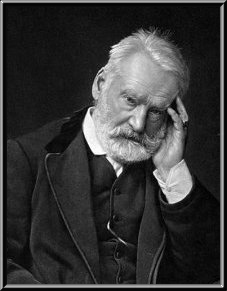
Il fait froid
L’hiver blanchit le dur chemin
Tes jours aux méchants sont en proie.
La bise mord ta douce main ;
La haine souffle sur ta joie.
La neige emplit le noir sillon.
La lumière est diminuée…
Ferme ta porte à l’aquilon !
Ferme ta vitre à la nuée !
Et puis laisse ton coeur ouvert !
Le coeur, c’est la sainte fenêtre.
Le soleil de brume est couvert ;
Mais Dieu va rayonner peut-être !
Doute du bonheur, fruit mortel ;
Doute de l’homme plein d’envie ;
Doute du prêtre et de l’autel ;
Mais crois à l’amour, ô ma vie !
Crois à l’amour, toujours entier,
Toujours brillant sous tous les voiles !
A l’amour, tison du foyer !
A l’amour, rayon des étoiles !
Aime, et ne désespère pas.
Dans ton âme, où parfois je passe,
Où mes vers chuchotent tout bas,
Laisse chaque chose à sa place.
La fidélité sans ennui,
La paix des vertus élevées,
Et l’indulgence pour autrui,
Eponge des fautes lavées.
Dans ta pensée où tout est beau,
Que rien ne tombe ou ne recule.
Fais de ton amour ton flambeau.
On s’éclaire de ce qui brûle.
A ces démons d’inimitié
Oppose ta douceur sereine,
Et reverse leur en pitié
Tout ce qu’ils t’ont vomi de haine.
La haine, c’est l’hiver du coeur.
Plains-les ! mais garde ton courage.
Garde ton sourire vainqueur ;
Bel arc-en-ciel, sors de l’orage !
Garde ton amour éternel.
L’hiver, l’astre éteint-il sa flamme ?
Dieu ne retire rien du ciel ;
Ne retire rien de ton âme !
Victor Hugo
(1802 – 1885)
Il fait froid
• fleursdumal.nl magazine
More in: 4SEASONS#Winter, Archive G-H, Archive G-H, Hugo, Victor, Victor Hugo
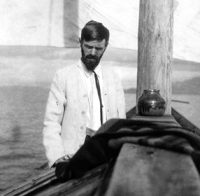
Winter-Lull
Because of the silent snow, we are all hushed
Into awe.
No sound of guns, nor overhead no rushed
Vibration to draw
Our attention out of the void wherein we are crushed.
A crow floats past on level wings
Noiselessly.
Uninterrupted silence swings
Invisibly, inaudibly
To and fro in our misgivings.
We do not look at each other, we hide
Our daunted eyes.
White earth, and ruins, ourselves, and nothing beside.
It all belies
Our existence; we wait, and are still denied.
We are folded together, men and the snowy ground
Into nullity.
There is silence, only the silence, never a sound
Nor a verity
To assist us; disastrously silence-bound!
D. H. Lawrence
(1885 –1930)
Winter-Lull
• fleursdumal.nl magazine
More in: 4SEASONS#Winter, Archive K-L, Archive K-L, Lawrence, D.H.
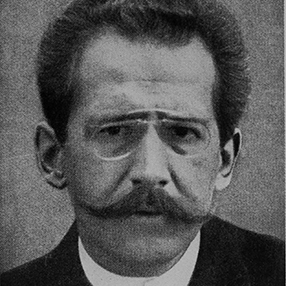
Auf einem Berg aus Zuckerkant
Auf einem Berg aus Zuckerkant,
unter einem blühenden Machandelbaum,
blinkt mein Pfefferkuchenhäuschen.
Seine Fensterchen sind aus Goldpapier,
aus seinem Schornstein raucht Watte.
Im grünen Himmel, über mir,
rauscht die Weihnachtstanne.
In meinem See aus Staniol
spiegeln sich alle ihre Engel, alle ihre Lichter!
Die kleinen Kinder stehn rum
und staunen mich an.
Ich bin der Zwerg Turlitipu.
Mein dicker Bauch ist aus Traganth,
meine Beinchen Streichhölzer,
meine listigen Äugelchen
Korinthen.
Arno Holz
(1863 – 1929)
Auf einem Berg aus Zuckerkant
(aus: “Phantasus”)
• fleursdumal.nl magazine
More in: #Experimental Poetry Archive, 4SEASONS#Winter, Archive G-H, Archive G-H, Expressionism, Grimm, Andersen e.o.: Fables, Fairy Tales & Stories
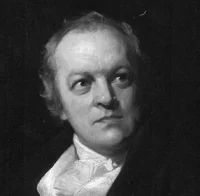
To Winter
O Winter! bar thine adamantine doors:
The north is thine; there hast thou built thy dark
Deep-founded habitation. Shake not thy roofs
Nor bend thy pillars with thine iron car.
He hears me not, but o’er the yawning deep
Rides heavy; his storms are unchain’d, sheathed
In ribbed steel; I dare not lift mine eyes;
For he hath rear’d his scepter o’er the world.
Lo! now the direful monster, whose skin clings
To his strong bones, strides o’er the groaning rocks:
He withers all in silence, and in his hand
Unclothes the earth, and freezes up frail life.
He takes his seat upon the cliffs, the mariner
Cries in vain. Poor little wretch! that deal’st
With storms; till heaven smiles, and the monster
Is driven yelling to his caves beneath Mount Hecla.
William Blake
(1757 – 1827)
To Winter
• fleursdumal.nl magazine
More in: 4SEASONS#Winter, Archive A-B, Archive A-B, Blake, William, CLASSIC POETRY
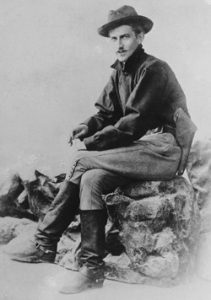
I saw a man
pursuing the horizon
I saw a man pursuing the horizon;
Round and round they sped.
I was disturbed at this;
I accosted the man.
“It is futile,” I said,
“You can never —”
“You lie,” he cried,
And ran on.
Stephen Crane
(1871 – 1900)
I saw a man pursuing the horizon
• fleursdumal.nl magazine
More in: *War Poetry Archive, Archive C-D, Archive C-D, Stephen Crane

A Burnt Ship
Out of a fired ship, which by no way
But drowning could be rescued from the flame,
Some men leap’d forth, and ever as they came
Near the foes’ ships, did by their shot decay;
So all were lost, which in the ship were found,
They in the sea being burnt, they in the burnt ship drown’d.
John Donne
(1572–1631)
A Burnt Ship
• fleursdumal.nl magazine
More in: Archive C-D, Archive C-D, Donne, John
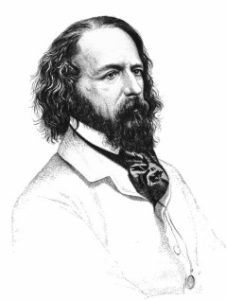
Crossing the Bar
Sunset and evening star,
And one clear call for me!
And may there be no moaning of the bar,
When I put out to sea,
But such a tide as moving seems asleep,
Too full for sound and foam,
When that which drew from out the boundless deep
Turns again home.
Twilight and evening bell,
And after that the dark!
And may there be no sadness of farewell,
When I embark;
For tho’ from out our bourne of Time and Place
The flood may bear me far,
I hope to see my Pilot face to face
When I have crost the bar.
Alfred Lord Tennyson
(1809-1892)
Crossing the Bar
• fleursdumal.nl magazine
More in: Archive S-T, Archive S-T, Tennyson, Alfred Lord
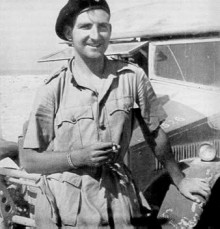
Simplify Me When I’m Dead
Remember me when I am dead
and simplify me when I’m dead.
As the processes of earth
strip off the colour of the skin:
take the brown hair and blue eye
and leave me simpler than at birth,
when hairless I came howling in
as the moon entered the cold sky.
Of my skeleton perhaps,
so stripped, a learned man will say
“He was of such a type and intelligence,” no more.
Thus when in a year collapse
particular memories, you may
deduce, from the long pain I bore
the opinions I held, who was my foe
and what I left, even my appearance
but incidents will be no guide.
Time’s wrong-way telescope will show
a minute man ten years hence
and by distance simplified.
Through that lens see if I seem
substance or nothing: of the world
deserving mention or charitable oblivion,
not by momentary spleen
or love into decision hurled,
leisurely arrive at an opinion.
Remember me when I am dead
and simplify me when I’m dead.
Keith Douglas
(1920 – 1944)
Simplify Me When I’m Dead
• fleursdumal.nl magazine
More in: Archive C-D, Archive C-D, Douglas, Keith, WAR & PEACE
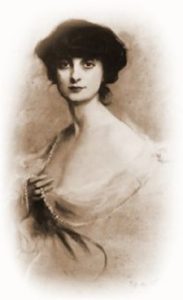
L’hiver
C’est l’hiver sans parfum ni chants.
Dans le pré, les brins de verdure
Percent de leurs jets fléchissants
La neige étincelante et dure.
Quelques buissons gardent encor
Des feuilles jaunes et cassantes
Que le vent âpre et rude mord
Comme font les chèvres grimpantes.
Et les arbres silencieux
Que toute cette neige isole
Ont cessé de se faire entre eux
Leurs confidences bénévoles.
– Bois feuillus qui, pendant l’été,
Au chaud des feuilles cotonneuses
Avez connu les voluptés
Et les cris des huppes chanteuses,
Vous qui, dans la douce saison,
Respiriez la senteur des gommes,
Vous frissonnez à l’horizon
Avec des gestes qu’ont les hommes.
Vous êtes las, vous êtes nus,
Plus rien dans l’air ne vous protège,
Et vos coeurs tendres ou chenus
Se désespèrent sur la neige.
– Et près de vous, frère orgueilleux,
Le sapin où le soleil brille
Balance les fruits écailleux
Qui luisent entre ses aiguilles.
Anna de Noailles
(1876 – 1933)
L’hiver
• fleursdumal.nl magazine
More in: 4SEASONS#Winter, Archive M-N, Archive M-N, Noailles, Anna de
Thank you for reading Fleurs du Mal - magazine for art & literature